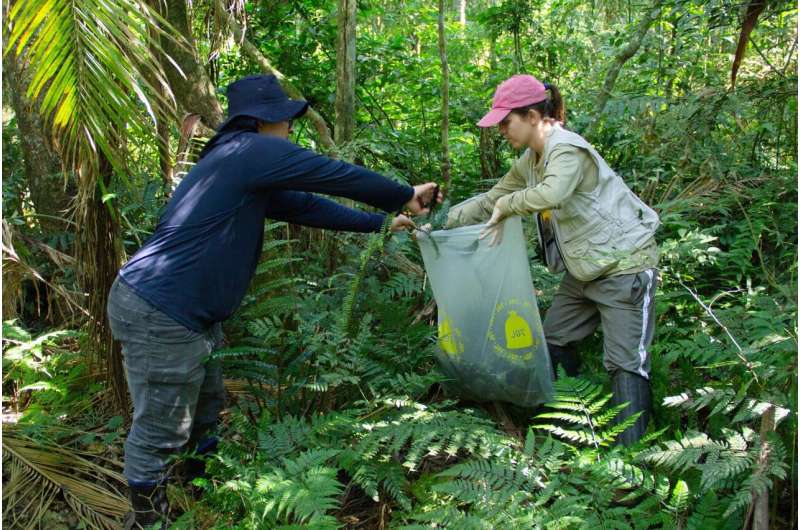This article has been reviewed according to Science X's editorial process and policies. Editors have highlighted the following attributes while ensuring the content's credibility:
fact-checked
peer-reviewed publication
trusted source
proofread
Study finds tropical ecosystems more reliant on emerging aquatic insects, potentially at greater risk

A team of researchers from Queen Mary University of London and the University of Campinas in Brazil has found that tropical forest ecosystems are more reliant on aquatic insects than temperate forest ecosystems and are therefore more vulnerable to disruptions to the links between land and water.
The study, published in the journal Ecology Letters, is the first to directly compare the interconnections between land and water in tropical and temperate environments via the emergence of aquatic insects.
The researchers used a technique called stable isotope analysis to trace the aquatic-prey signal in the tissues of arthropod predators such as spiders, going away from water into land, around streams in English, Welsh, and Scottish forests and in Brazil's Amazonian and Atlantic rainforests.
They found that the spiders were consuming more aquatic insect prey in the tropics than in the UK, resulting in higher overall dietary diversity in the tropical food-webs, on-land. Their results indicated that tropical terrestrial animals are more reliant on and impacted by emerging aquatic insects. This suggests tropical environments are more vulnerable to future disruption to the interconnections between land and water.
"Our findings show that we cannot simply apply knowledge from research in temperate zones to protect tropical ecosystems," said Dr. Pavel Kratina, senior author of the study and Senior Lecturer in Ecology at Queen Mary University of London. "That tropical ecosystems are more vulnerable to disruptions to the links between land and water is worrying considering the increasing human pressures on tropical freshwater ecosystems, which are among the most threatened in the world."
Emerging aquatic insects can become a pathway for negative human impacts to move from one environment to another. For example, polluting a stream may reduce insect numbers, which may in-turn reduce availability of nutritious food for land-based predators. Tropical aquatic insects are under threat of catastrophic declines because of human activity and climate change—the researchers' results suggest this would have cascading consequences across tropical environments.
"Riparian buffers" are protected strips of land around waterways which contribute to protecting the links between land and water. However, the size of these buffer-strips (commonly between 5—100m) are considered inadequate for the protection of a lot of terrestrial biodiversity around water. In Brazil, the regulations surrounding buffers have even been relaxed over the last decade.
The researchers' study stresses the need for greater protection of riparian buffers and broader consideration of the links between ecosystems, rather than considering different habitats in isolation, particularly in the tropics.
"Our research took us to remote parts of the world from the Amazon jungle and Iguaçu River basin in Brazil to Snowdonia national park in Wales and The Trossachs in Scotland," said Dr. Liam Nash, lead author of the study and recent Ph.D. graduate from Dr. Kratina's lab at Queen Mary.
"We braved ticks, wasps, midges, and snakes to collect our samples, and saw animals such as harpy eagles and tapirs along the way. We ran into challenges with the pandemic, which saw me having to fly out of Brazil on one of the last available flights in March 2020 as travel rules were changing hourly. This work could not have happened without the help of experienced local field guides and close collaboration with scientists and students from Brazil."
More information: Liam Nash et al, Tropical and temperate differences in the trophic structure and aquatic prey use of riparian predators, Ecology Letters (2023). DOI: 10.1111/ele.14322. onlinelibrary.wiley.com/doi/full/10.1111/ele.14322
Journal information: Ecology Letters
Provided by Queen Mary, University of London



















